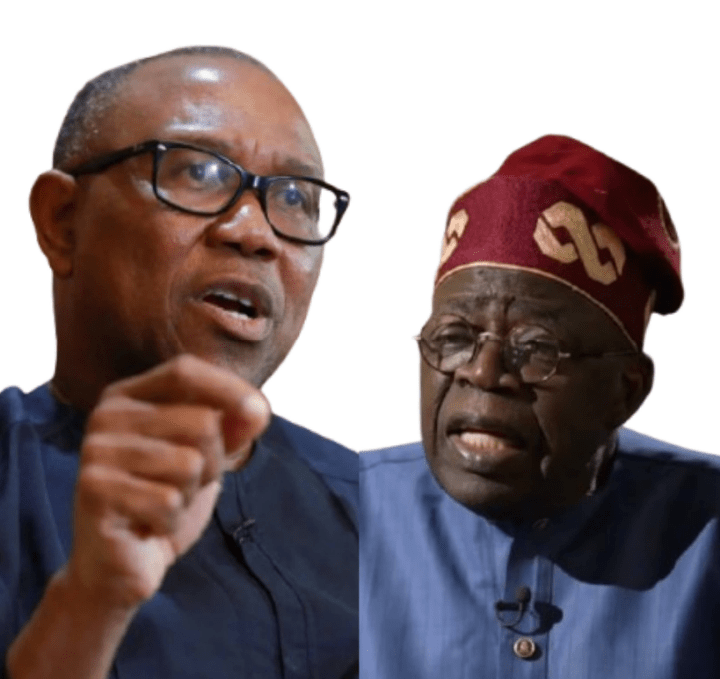This post has already been read at least 11754 times!
In a searing critique of President Bola Tinubu’s administration, former Labour Party (LP) presidential candidate, Peter Obi, has condemned the federal government’s handling of key national policies, especially the removal of fuel subsidy, floating of the Naira, and the ongoing leadership crisis within the Labour Party.
Obi accused the government of lacking vision, implementing reforms haphazardly, and deliberately destabilizing the opposition to weaken democratic accountability.
Speaking during an interview aired Monday on Arise Television, Obi stated that while he supports the removal of fuel subsidy, Tinubu’s abrupt and unstructured implementation has deepened economic hardship rather than alleviating it.
“I’ve consistently maintained that I would have removed the fuel subsidy. If you go to my manifesto, it’s there—steps I would have taken to do it in an organised manner,” he said.
Obi emphasised that the subsidy regime was plagued with corruption and deserved to be dismantled. However, he argued that any such reform should have been executed with a clear national plan and stakeholder engagement.
“There is nothing wrong in the removal of subsidy; what is wrong is the haphazard way in which it was announced and implemented. Everybody knows that the subsidy regime was that of criminality,” he added.
The former Anambra State governor lamented that the massive savings from the subsidy removal have not translated into tangible benefits for the Nigerian people.
“The savings from subsidy removal from the Tinubu administration are not being reflected in critical areas of human development, such as education, health, and poverty alleviation,” he said, questioning the administration’s transparency and priorities.
Obi went further to describe the current state of the Nigerian economy as a reflection of poor leadership. “What Nigerians have faced in the last two years are skyrocketing prices, a weaker Naira and low productivity,” he said.
According to him, floating the Naira without first bolstering production in sectors like agriculture and manufacturing was a misstep that worsened inflation and economic instability.
“The government had assured Nigerians that removing subsidy was to free funds for other development purposes, encourage savings and reduce borrowing. But honestly, the billions saved, where is it? Where is it invested in critical areas of development?” Obi asked pointedly.
He also criticised the federal government’s decision to prioritise the Lagos-Calabar Coastal Road project in the face of deep-rooted national insecurity and infrastructural decay.
“The insecurity (in Nigeria) is far more fundamental than roads. Would you prefer a Lagos-Calabar Coastal Road when the internal roads are not motorable?” he queried. “If you say our problem is insecurity, our problem is power, then let’s deal with those things. How do you go to your village when there is insecurity?”
Turning to the internal wranglings within the Labour Party, Obi directly accused the federal government of instigating and sustaining the ongoing crisis for its own political advantage.
He said the ruling administration was employing propaganda and division to weaken the opposition.
“This is what you get always in Nigeria, because we now live in a country of propaganda and lies – and they manufacture it,” he said. “The problem we have in Labour Party is a problem instigated and sustained by the government of today.”
Responding to questions about the bitter divisions within the LP, Obi referenced the ongoing factional battle that has split the party into two rival camps—one led by Julius Abure, which controls the Utako national secretariat, and another supported by key figures like Governor Alex Otti, Senator Victor Umeh, and himself, under the leadership of a National Caretaker Committee chaired by Senator Nenadi Usman.
“I don’t need to tell you when you have a party chairman who calls a state governor a dwarf and dwarf thinking. Forget about me, so it’s not weak. Okay, I’m weak, but it’s not weak. Is every other person there weak? So we’re not sincere with ourselves,” he said, referencing the toxic rhetoric and divisive tactics employed in the dispute.
Obi concluded by warning that the politics of deception and sabotage could erode Nigeria’s already fragile democracy. “You speak the truth and they call you names. They are trying to put problems everywhere; they want to even put problems in families,” he said.
As Nigeria continues to grapple with economic distress and political uncertainty, Obi’s remarks underscore growing discontent with the Tinubu administration’s governance style and the broader implications of state interference in opposition politics.
This post has already been read at least 11754 times!

